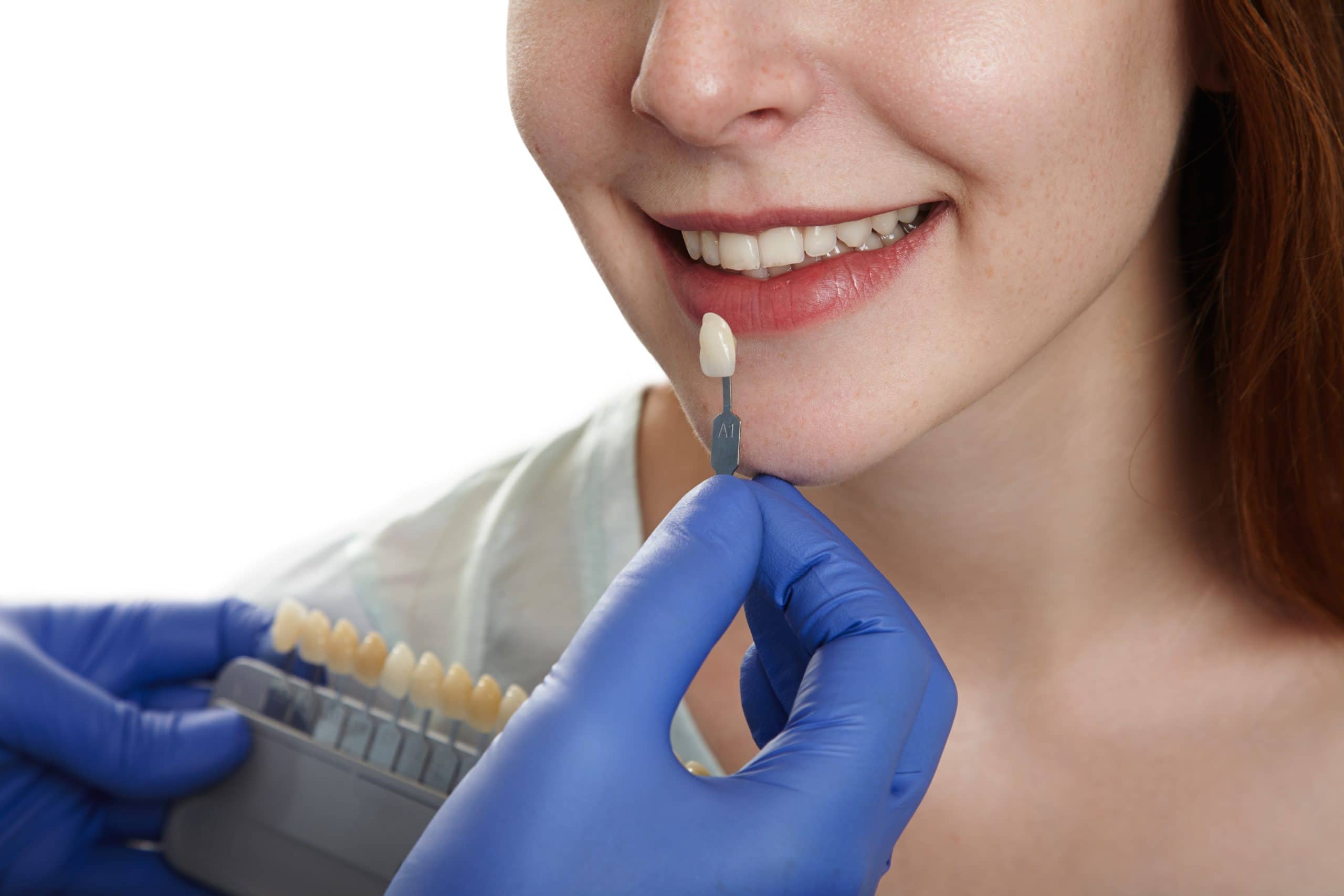
What Needs to Be Done Before Getting Veneers Replaced: A Patient Guide
By Dr. Bhumit Shah
Veneers can enhance the appearance of your smile, but like many dental treatments, they may eventually require replacement. Whether due to normal wear, cosmetic changes, or shifting oral health needs, getting veneers replaced is a standard part of maintaining dental aesthetics and function.
This guide is designed to help you feel prepared and confident before starting the dental veneer replacement process. We’ll discuss what to expect and how to make the experience easier, from your first consultation to the steps you can take beforehand. Knowing what to plan for can support your comfort and overall oral health if you’re considering replacing your veneers.
Contents
Summary of The Content
- Veneers may require replacement due to natural wear, staining, chipping, or changes in the aesthetic appearance of the smile.
- During the initial consultation, a dental professional will assess your current veneers, tooth structure, and surrounding teeth.
- Treatment planning is tailored to your dental health needs, lifestyle habits, and aesthetic preferences.
- Good dental hygiene supports accurate evaluation and successful outcomes of veneer replacement.
- Providing medical history, private health fund details, and addressing any questions can help patients feel more confident and prepared.
- Before getting veneers replaced, you must confirm your appointment details and follow any instructions from your dental clinic.
- Practical arrangements, such as transport and time off work, can help you feel more prepared.
- Supporting gum health and avoiding hard foods before the procedure may assist with healing and comfort.
- Aftercare is crucial in maintaining your new veneers and long-term oral health.
- Regular dental check-ups support your oral health and help maintain your veneers.
Why Dental Veneers May Need Replacing
Over time, dental veneers may need to be replaced to maintain long-term dental health. Factors like daily wear, changes in bite, or cosmetic preferences can all contribute. Veneer replacement is common and often reflects natural changes in your oral environment—not necessarily a problem with the original veneers.
Common reasons dental veneers may require replacement include the following:
- Chipped or cracked veneers:
Veneers can become chipped or cracked over time, often from biting hard objects, grinding teeth, or the effects of normal wear. - Staining or discolouration:
Veneers may appear discoloured, especially if the surrounding natural teeth change colour or if dietary habits include stains from foods and drinks. - Loosening of bonding material:
Over the years, the dental cement or bonding material holding veneers in place may weaken, causing them to loosen or feel unstable. - Gum recession:
As gums recede, the edges of veneers or the underlying tooth structure may become exposed, which can affect both appearance and comfort. - Changes in smile goals or preferences:
Some patients choose to replace veneers to achieve a new look, such as switching from composite resin to porcelain for improved aesthetics. - Natural ageing of materials:
Veneer materials, especially composite resin, can wear down with time, making replacement a normal part of long-term dental care.
Only a qualified dental professional can assess whether your veneers need replacing. Each case is unique; treatment recommendations are tailored to your dental health and individual goals.
What to Expect During the Consultation Appointment
Before replacing dental veneers, your dentist will arrange a consultation appointment to carefully assess your oral health and the current veneers. This visit is a key step in the dental veneer replacement process. The goal is to develop a treatment plan that aligns with your goals, dental concerns, and oral health needs.
During the consultation, the dental professional will examine your existing veneers, supporting teeth, and gum health. Your dentist may also discuss veneer material options, such as porcelain or composite resin. In some cases, alternative treatments, such as dental crowns, may be suggested.
This stage allows patients to ask questions, understand the benefits and limitations of each option, and receive professional guidance. Each treatment plan is customised, so what happens next depends on the condition of your current veneers and the health of your natural teeth.
Assessment of Existing Veneers and Teeth
During your consultation, the dentist will carefully examine your veneers and the natural tooth structure beneath them. This assessment helps identify whether your veneers need replacement and guides your treatment plan to reflect your overall dental health.
Key areas your dentist will check include the following:
| Area Assessed | What the Dentist Looks For |
| Veneers | Chips, cracks, looseness, or staining |
| Supporting Teeth | Signs of decay, damage, or poor fit with veneers |
| Gums | Gum health, signs of gum disease, or gum recession |
| Bite Alignment | Wear patterns, teeth grinding, or uneven bite pressure |
This structured review enables the dentist to recommend replacement dental veneers or alternative treatments tailored to your specific oral health needs.
Treatment Planning
After assessing your veneers and teeth, your dentist will create a treatment plan that reflects your oral health and goals. Depending on your current dental structure, this plan may involve replacement veneers or other dental treatments.
Treatment planning usually involves:
- Reviewing veneer options
You may be offered porcelain or composite resin veneers. Each material has different benefits, including appearance, durability, and stain resistance. - Considering alternative treatments
If the underlying tooth structure requires more support, a dental crown may sometimes be recommended. - Customising the plan
Every patient has unique dental concerns, so the plan is tailored to fit your oral health, lifestyle habits, and aesthetic preferences. - Discussing long-term care
The dentist will explain how to maintain your veneers and support your overall dental health through regular visits and good hygiene practices.
This structured planning supports a treatment pathway that is realistic, practical, and tailored to your specific needs.
Preparing Before the Consultation
Getting ready for your consultation helps the dentist provide a clear and accurate assessment. Arriving prepared helps the visit run more efficiently, allowing you to focus on your dental concerns.
Simple steps, such as maintaining good dental hygiene, providing relevant medical information, and jotting down questions, can make a significant difference. These actions provide your dental professional with the key information they need to create a plan suited to your oral health and goals.
The section below contains practical tips to help you feel organised and confident before your appointment.
Maintain Good Oral Hygiene
Keeping your teeth and gums clean before the consultation supports a more accurate assessment. It also helps your dentist recommend an appropriate treatment for your needs.
Practical steps include the following:
- Brush twice daily with a non-abrasive toothpaste:
This helps protect natural enamel and keeps the tooth surface clean for your dentist to examine. - Floss carefully between teeth and veneers:
Flossing removes food particles and plaque that may otherwise affect gum health and make it harder to assess your veneers. - Use an alcohol-free mouthwash:
A gentle rinse supports gum health without irritating the soft tissues around your veneers. - Avoid sticky or hard foods before your visit:
Foods like lollies, nuts, or chewing ice can place pressure on veneers and may even cause damage.
Healthy gums and a clean tooth surface make it easier for your dental professional to check your veneers. They may also identify any signs of tooth decay and assess your overall dental health.
Bring Medical and Dental Information
Providing accurate information to your consultation helps your dentist plan treatment safely and effectively. Having these details ready ensures you don’t overlook anything important.
Information to prepare before your visit:
| What to Bring | Why It’s Important |
| Current list of medications | Allows your dentist to check for possible interactions |
| Medical and dental history | Provides insight into past treatments and oral health issues |
| Private health fund details | Allows your dentist to understand if your health fund cover may apply, depending on your policy |
| Allergies or sensitivities | Identifies safe use of dental materials or anaesthetics |
Arriving with these details makes your consultation smoother and helps your dental professional create a veneer replacement plan that fits your health and circumstances.
Write Down Questions to Ask
Preparing questions before your consultation helps you make the most of your time with the dentist, ensuring you leave with clear, reliable information.
Examples of helpful questions include the following:
- About treatment options:
- What are the advantages and disadvantages of porcelain versus composite resin veneers for my needs?
- Are there alternative treatments, such as dental crowns, that may be more suitable?
- About longevity and care:
- How long do veneers last, and what factors influence their lifespan?
- What are the essential aftercare steps for maintaining oral health with new veneers?
- About your overall plan:
- How will replacing veneers affect my surrounding teeth and gums?
- What are the expected costs, and do financing or health fund options apply?
Writing down your questions ensures you address your primary dental concerns and boosts your confidence in the dental veneer replacement process.
Plan Time and Budget Considerations
If you’re getting veneers replaced, knowing how long your appointment may take and the estimated costs helps you feel more informed and prepared. Planning also supports a more relaxed consultation focused on your health—not the logistics.
Time Considerations
- Confirm how long your consultation will take and whether additional time is needed for scans or impressions.
- Leave space in your schedule so you don’t feel rushed before or after your visit.
- Plan for any follow-up appointments if your veneer treatment requires multiple stages.
Budget Considerations
- Ask about the estimated cost for veneer replacement. Pricing may vary depending on your treatment needs, the chosen materials, and the required procedures. After assessing your oral health, your dentist will provide a personal quote.
- Discuss accepted payment methods, including any available financing options and repayment plans.
- Check with your private health fund to determine if any part of the veneer replacement process is eligible for fee relief.
Planning these details can help you arrive at your consultation well prepared and focused on your goals.
Preparing Before the Veneer Replacement Procedure
Once your treatment plan is confirmed, the next step is preparing for the procedure. Organising details in advance helps reduce stress during the day. Preparation may involve confirming your appointment, arranging transportation, or following your dentist’s oral health instructions. These steps support both comfort and long-term dental health. The sections below contain practical tips to help you feel confident, comfortable, and ready for treatment.
Confirm Appointment Details
Double-checking your appointment details helps avoid last-minute confusion and confirms you know exactly what to expect on the day of your veneer replacement.
Before your procedure, confirm the following:
- The exact date and time of your appointment
- How long is the treatment expected to take
- Whether scans, impressions, or temporary veneers are planned
- Any special instructions from the dental clinic, such as fasting, if required
- Contact details in case you need to reschedule or ask questions
Organising these details in advance helps you feel confident and well prepared for your dental veneer replacement procedure.
Make Practical Arrangements
Organising practical details ahead of time helps your veneer replacement procedure go smoothly. It also allows you to focus on your dental treatment instead of logistics.
Things to plan before your appointment:
- Arrange transport if a longer treatment is expected
- Take time off work if needed, especially if recovery time is advised
- Prepare meals in advance, as eating may feel uncomfortable immediately after treatment
- Wear comfortable clothing to your appointment
- If you play contact sports, bring or ask about a mouthguard for future protection
By preparing these details in advance, you can feel more relaxed, allowing the focus to remain on achieving your goals.
Support Oral Health Before Treatment
Taking care of your teeth and gums before the procedure makes it easier for your dentist to achieve optimal results. It also supports your recovery and long-term dental health.
Do’s
- Brush and floss thoroughly to reduce plaque and food particles.
- Use a non-abrasive toothpaste to protect natural tooth enamel.
- Follow your dentist’s pre-treatment instructions, such as dietary advice.
- If you grind your teeth, consider a night guard that protects both your veneers and natural teeth.
Don’ts
- Before your appointment, avoid sticky or hard foods, such as lollies, nuts, or chewing ice.
- Don’t skip your regular oral hygiene routine in the days prior to treatment.
- Avoid trying new whitening products, as they can make it more challenging for your dentist to match your veneers.
These simple steps help support your oral health, protect your existing teeth, and prepare your mouth for the veneer replacement process.
Planning for Aftercare and Dental Veneer Maintenance
Looking after your veneers after replacement is as necessary as preparing for the procedure. Good aftercare is essential for protecting your veneers, surrounding teeth, and overall oral health.
- Daily Habits:
- Brush and floss every day using a non-abrasive toothpaste
- Avoid biting on hard objects, such as ice or pens
- Limit foods and drinks that stain teeth, such as red wine and coffee
- Protective Measures:
- Wear a night guard if you grind your teeth while sleeping
- Avoid nail-biting or using your teeth to open packages
- Be mindful when eating hard or sticky foods that may place pressure on veneers
- Professional Dental Care:
- Schedule regular dental visits to monitor the veneer condition and gum health
- Ask your dentist for advice if veneers feel loose or uncomfortable
- Follow any personalised care instructions provided by your dental professional
Following these habits can help your veneers resist staining and protect your natural enamel, allowing you to enjoy a confident smile for years with proper care and maintenance.
Final Thoughts
Preparing for veneer replacement involves three stages: being organised before your consultation, being ready before the procedure, and being mindful of aftercare afterwards. Each stage is crucial in supporting the process so that it runs smoothly and supports your long-term oral health.
Following your dentist’s guidance helps you feel informed and confident. Preparation involves protecting both your natural teeth and new veneers, from confirming appointment details to maintaining good dental hygiene.
If you are considering replacing veneers, booking a consultation with a dental professional is the ideal way to receive tailored advice. Our team at Dentalcare of Forrestfield can guide you through each stage of the dental veneer replacement process. We customise our service to meet your specific needs and goals.



